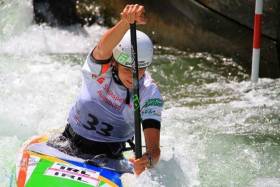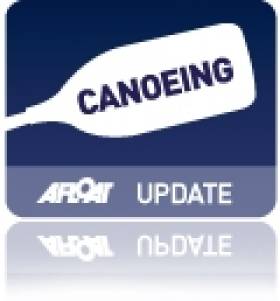Displaying items by tag: C1
Superb Performance Puts Jegou Into Canoe Slalom World Finals
#Canoeing: Liam Jegou qualified for the final at the canoe slalom World Championships in Krakow this morning. Going off last of the 20 qualifiers for the semi-final, with a high standard already set, Jegou knew he had to produce a good performance. He put in a superb fault-free run to finish second. His time of 90.48 seconds was just .27 off the top time.
Canoe Slalom World Championships, Under-23 and Junior, Krakow, Poland (Irish interest)
Men
Under-23 C1 Semi-Finals (10 qualify): 2 L Jegou 90.48 seconds.
Jegou's Penalty-Free Run Not Fast Enough To Secure Olympic Place
#Canoeing: Ireland C1 paddler Liam Jegou finished outside the top 10 nations at the canoe sprint World Championships in Lee Valley in England today and missed out on this chance of qualifying the boat for the Olympic Games. Jegou went off second in his semi-final and had a penalty-free run down the course, but his time of 106.29 seconds was not fast enough to stand in the top 10 nations. Jegou came in 27th, ahead of Italy and Canada. Spain, Portugal and Australia also missed out.
Canoe Slalom World Championships, Lee Valley, London, Day Five (Irish interest)
Men
C1 – Semi-Finals (10 to Final): 27 L Jegou 106.29
K1 – Team Final: 19 Ireland 161.62
Canoeist Liam Jegou Takes World Championship Silver
#CANOEING: Ireland junior canoeist Liam Jegou took a silver medal today at the Canoe Slalom Under-23 and Junior World Championships in Sydney, Australia. On a difficult course in Penrith, only Florian Breuer of Germany was faster in the C1 (canoe single) than the Irishman. Both men took one touch, Jegou’s on the fourth gate. Roman Malyshev of Russia was third and Britain’s Samuel Ibbotson fourth.
“It’s great, I am really happy,” Jegou said. He had come close to a podium finish in the last two years, finishing sixth last year and fourth in 2012.
Canoe Slalom World Under-23 and Junior Championships, Penrith, Sydney (Irish interest):
C1 Men – Semi-Final (10 qualify): 1 Britain (S Ibbotson) 109.47; 6 Ireland (L Jegou) 112.11 (2.64 behind). Final: 1 Germany (F Breuer) 104.31, 2 Ireland (L Jegou) 107.61, 3 Russia (R Malyshev) 108.54.































































